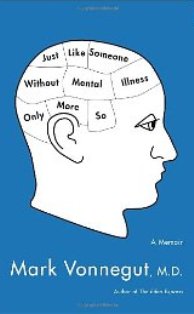November 16th, 2010 by Dinah Miller, M.D. in Better Health Network, Book Reviews
No Comments »


 I’ll cut to the chase: I loved this book. Five stars. Two thumbs up.
I’ll cut to the chase: I loved this book. Five stars. Two thumbs up.
When I read books, especially psychiatry books that I write about on Shrink Rap, I often read more carefully and sometimes more critically. I was so immersed in reading “Just Like Someone Without Mental Illness Only More So” that I didn’t stop to think, I just went on the journey.
Mark Vonnegut is a pediatrician and the son of my favorite author when I was in junior high school. His memoir is a poignant and candid account of his struggles with, well, life in general, and life with a psychotic illness in particular. Schizophrenia, bipolar disorder — who knows? (I’ll vote for bipolar disorder.) Some illness where he had three episodes in his twenties, then another episode 14 years later.
Thorazine and lithium and megavitamins and psych wards. Xanax and alcohol and how humiliating it is to be psychotic on a stretcher in the ER hallway of the hospital where he works. Divorce and remarriage. First and second families. Childhood as the son of a financially struggling, not-yet-famous eccentric writer, and adulthood as the son of an icon. Vonnegut is a hippy, a mainstream doctor, a middle-aged softball player, then finally a guy who accidentally poisons himself with wild mushrooms. Read more »
*This blog post was originally published at Shrink Rap*
October 2nd, 2010 by RyanDuBosar in Better Health Network, News, Research
No Comments »

British scientists announced that attention-deficit/hyperactivity disorder (ADHD) has been linked to deleted or duplicated DNA segments (copy number variants), which leads to developmental difference in the brains of children with the condition.
Researchers scanned genomes of 366 children with ADHD and compared them with 1,047 unrelated, ethnically matched control subjects. They reported full results in The Lancet.
Rare copy number variants were almost twice as common in children with ADHD compared to the other children. Researchers commented to Reuters that there was a significant overlap between copy number variants found in ADHD and elements of the genome linked to autism and schizophrenia, specifically in a region on chromosome 16.

*This blog post was originally published at ACP Internist*
August 10th, 2010 by Steven Roy Daviss, M.D. in Better Health Network, News, Research
No Comments »


 From the front page of [the August 1st] Baltimore Sun: Researchers Explore Link Between Schizophrenia, Cat Parasite. Frank D. Roylance writes:
From the front page of [the August 1st] Baltimore Sun: Researchers Explore Link Between Schizophrenia, Cat Parasite. Frank D. Roylance writes:
Johns Hopkins University scientists trying to determine why people develop serious mental illness are focusing on an unlikely factor: a common parasite spread by cats. The researchers say the microbes, called Toxoplasma gondii, invade the human brain and appear to upset its chemistry — creating, in some people, the psychotic behaviors recognized as schizophrenia. If tackling the parasite can help solve the mystery of schizophrenia, “it’s a pretty good opportunity … to relieve a pretty large burden of disease,” said Dr. Robert H. Yolken, director of developmental neurobiology at the Johns Hopkins Children’s Center. Read more »
*This blog post was originally published at Shrink Rap*
August 11th, 2009 by Dr. Val Jones in True Stories
10 Comments »
I was coming to the end of my ER shift and realized that a fairly large list of patients still waiting to be seen. I scanned the chief complaints listed on our white triage board to see if there was a straight forward case that I could handle quickly before I went home. Since it was early in the morning, we had the typical extremes of patients – those who were badly injured (drunk driving is more common in the wee hours) and those who were really weird.
ER nurses are amazingly adept at capturing the seriousness of a complaint with their choice of words. Reading between the lines is a bit of an art form – and part of the natural communication in a busy ED. I understood the art fairly well, though this night I missed a big clue. Here were some of the chief complaints that I could choose from:
1. Crushing substernal chest pain x1hour
2. Butt twitching x3 months
3. Head vs. light post
4. Ear pain x2 days
First of all I made sure that a colleague was with patient #1, which left me a choice between patient #2 – clearly weird and doubtful that I’d be able to resolve his problems any time soon, patient #3 – probably going to take a lot of sutures and more time than is left in my shift, and patient #4 – a fairly innocuous-seeming issue, probably otitis media.
Needless to say, I chose patient #4… though I hadn’t recognized the subtle distinction between “ear pain” and “ear ache.” I was about to figure this out the hard way.
As I drew back the curtain to patient #4’s room, I saw a tall, thin man sitting bolt upright in the chair next to the stretcher. He was polite and respectful – but there was something odd about him. A few minutes into our interview about his ear pain, I finally put my finger on it. The guy never blinked.
After several more minutes of what could only be described as fairly straight forward answers to medical history questions – and a fully negative review of systems – I had this sneaking feeling that Patient #4’s pain wasn’t otitis media.
“I’d like to ask you a question that might seem kind of strange…” I said, peering intently at his face.
“Ok,” said the young man.
“Have you ever thought that your pain is related to a transistor radio of some sort in your ear?”
His eyes grew as large as saucers.
“Yes! How did you know?!”
And there it was – a young man with schizophrenia, experiencing his first psychotic break. It took me a few hours to get him a full work up and a discharge plan to the inpatient psych unit… and I was very late getting home from this shift. So much for a straight forward case…
I wonder what would have happened if I’d chosen patient #2?

 I’ll cut to the chase: I loved this book. Five stars. Two thumbs up.
I’ll cut to the chase: I loved this book. Five stars. Two thumbs up.



 From the front page of [the August 1st] Baltimore Sun:
From the front page of [the August 1st] Baltimore Sun: 







